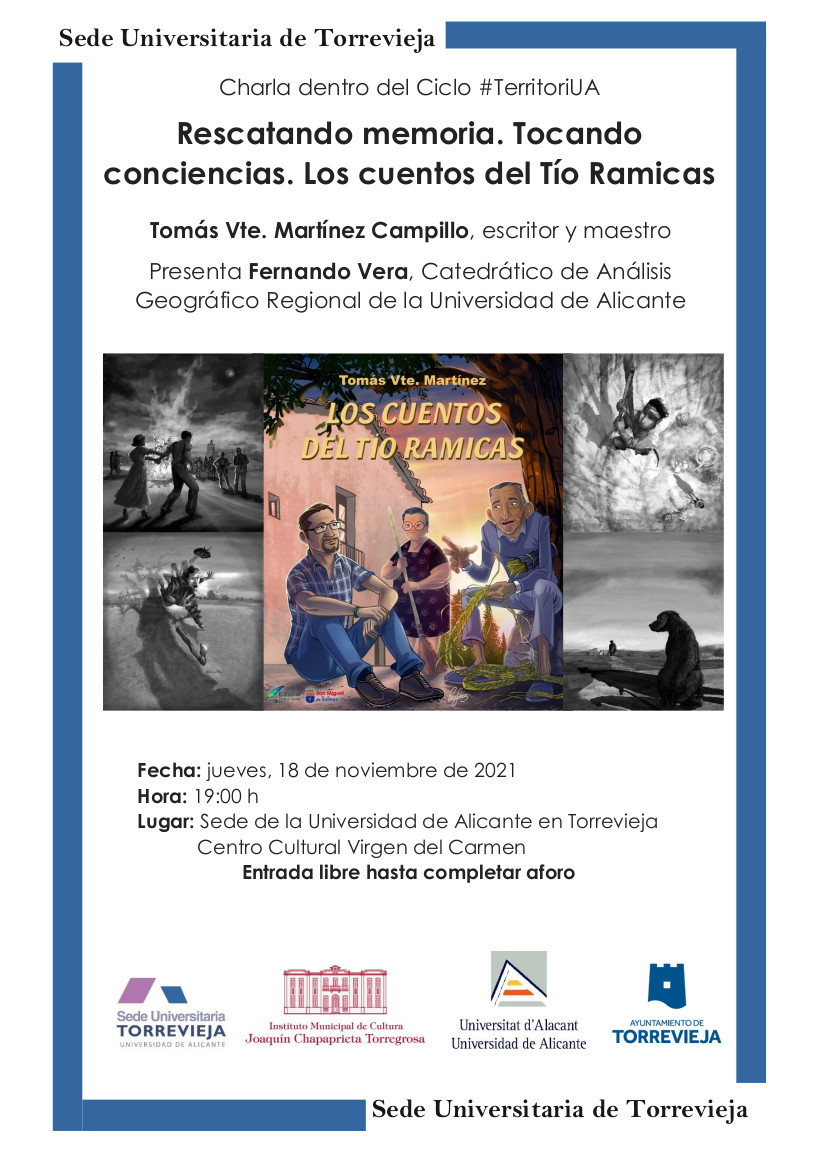The Cycle "Dialogues in the Territory" begins at the Torrevieja University Venue

The talk will address the need to protect, conserve and value the cultural heritage of our territory: Campo de Salinas. And how is it necessary to ensure that the social group linked to that heritage is a participant and an accomplice in its conservation. Within this framework is inscribed the book of stories Los cuentos del Tío Ramicas, made up of four stories and which take place around a municipal rural house on the fictitious La Candelaria farm. Tío Ramicas and Tía Esperanza are the landlords of that old farmhouse converted into accommodation and visitors learn interesting anecdotes, customs and trades from the area that have been almost forgotten through the mouths of the landlords.
The second appointment of the cycle will take place on November 25, at the Headquarters at 7:00 p.m., with the conference "From the Torrevieja Lagoon to industry and medicine", by Rosa Mª Martínez Espinosa, professor of the Department of Agrochemistry and Biochemistry at the University of Alicante, with a presentation by Ricardo Recuero, Councilor for Innovation of the Torrevieja City Council. The talk aims to value the potential of the microorganisms in the brine and muds of the Torrevieja Lagoon, taking as a reference the coastal and inland salt flats of the province of Alicante that have been studied in detail. It is expected that the study of the microbial biodiversity of the lagoon will provide new data on the species that inhabit it, as well as on the production of molecules of interest for industry and biomedicine, such as enzymes resistant to salt and high temperatures, antibiotics , degradable plastics, and compounds with high pigmenting power and high antioxidant activity.
Book "The stories of Uncle Ramicas"
The stories are peppered with traditional chores, trades that have disappeared, words in disuse, of a popular cultural heritage that only remains in the memory of older people and is unknown to younger generations. According to the author, the genesis of this book is in the conversations with his parents and other older people when his interest in local ethnography was awakened. In his parents, Tomás and Carmen, the characters of Tío Ramicas and Tía Esperanza are inspired. For the author, reading The Tales of Tío Ramicas can be a good way to reconnect with the roots of the town. In a bid for integration, Uncle Ramicas stories have been translated into English to bring local popular culture closer to foreign residents living in the municipality.
The cover has been made by the well-known San Miguel cartoonist Paco Sáez, a member of the Film Academy and winner in 2020 with the Goya for the best animation short: Madrid 2120. The interior illustrations are the work of the plastic artist Begoña Movellán. The conversion of the manuscript into a book has been carried out by the Murcian publisher Pluma Verde. The edition is the work of the Department of Culture and Science of the City of San Miguel de Salinas.
THE AUTHOR: Tomás Vicente Martínez. San Miguel de Salinas, 1957. He has published the novels: The Site (2007), This will be my flag (Red Circle, 2013), Segura (Malbec editions, 2017), Water Cuatreros (Editorial Pluma Verde, 2019), Wood and lead (Editorial Pluma Verde, 2020) .The short story books: Abonico (Editorial Pluma Verde, 2018), 15 holes (Malbec editions, 2018). And the poetry books: Melankoría (Costa Literaria editions, 2011), Envido (Editorial Pluma Verde, 2018).
Rosa Maria Martinez Espinosa
She obtained a Bachelor of Biology at the University of Alicante in 1998. That same year she began her training period as a researcher in the group of Extremophiles of the UA, obtaining the title of Doctor of Biology in 2003. During the development of the Doctoral Thesis she counted With a scholarship from the Juan Gil-Albert Institute of Culture of Alicante, and the Doctoral Thesis, he obtained the Extraordinary Prize. She continued her training as a researcher with postdoctoral stays at the University of East Anglia, UK. In 2011, she definitively joined the staff of the University of Alicante as a University Professor in the area of Biochemistry and Molecular Biology, in 2017 she created the research group "Applied Biochemistry" and in 2020 she promoted to University Professor . The research carried out to date is related to: microbial metabolism (in particular Extremophilic microorganisms), purification and characterization of enzymes with potential applications in industry and biotechnology, optimization of protocols for the genetic manipulation of microorganisms, characterization of gene regulation, carotenoid production (pigments), design and development of bioremediation processes for contaminated water and soils using microorganisms. She has been elected president of the organizing committee of the international congress European Nitrogen Cycle Meeting in 2009 and 2
019 and President of the “Bacterial Electron Transfer Meeting” that will take place in 2021 in Alicante. In the academic field, she has taught in PhD programs, Master in Biomedicine, Bachelor and Bachelor of Biology, Bachelor of Chemistry and Diploma in Nursing programs since 2001 His teaching work has been recognized with the 2013 Teaching Excellence Award by the Social Council of the University of Alicante.
Since 2008 she has held academic management positions at the Faculty of Sciences of the University of Alicante. He is a member of the panel of experts for the verification, renewal of accreditation, modification and institutional accreditation of ACSUCYL (Agency for the quality of the university system of Castilla y León) and of the panel of renewal of accreditation of ANECA (National Agency for the Evaluation of Quality and Accreditation). In addition, since December 2020 she is Vice-Rector for International Relations and Cooperation at the University of Alicante.